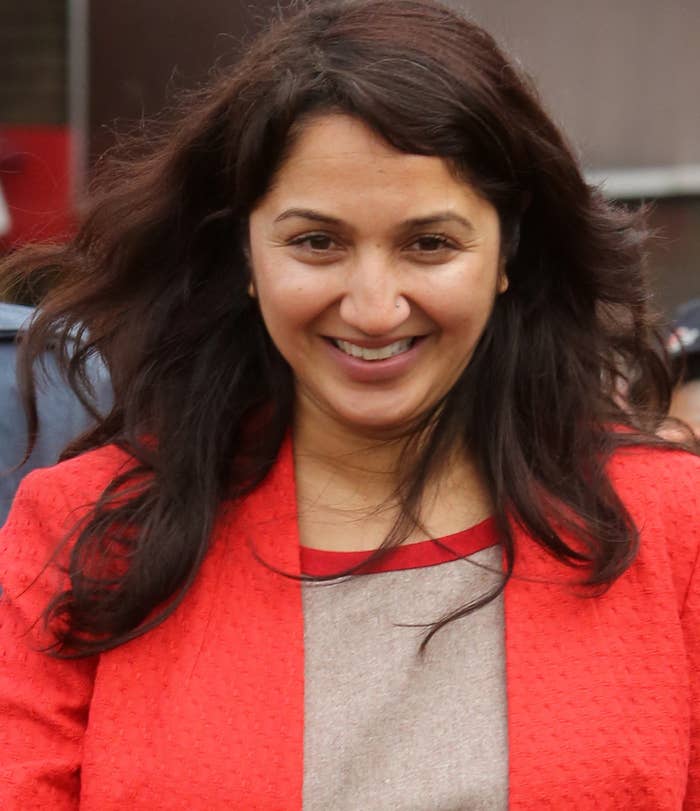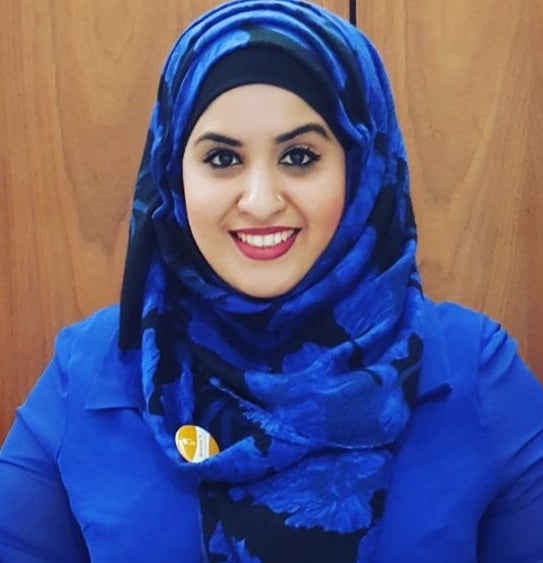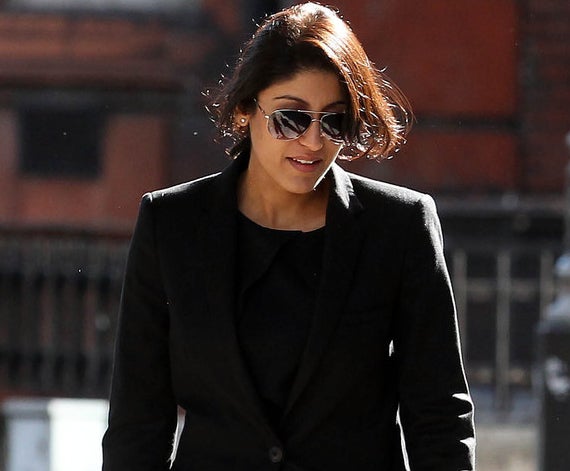Amina Lone, 45, has been involved in party politics for over a decade. She has been a Labour councillor for seven years, and although there is now a record number of Muslim women MPs sitting in the Commons, Lone believes it has only become harder for South Asian Muslim women to enter and stay in British local politics.
“I've certainly been vilified and ostracised, and been labelled a bad Muslim, not good enough Muslim, a sellout, a gori [a white person] – the usual stuff they throw at women, and much worse than that,” the Manchester councillor tells BuzzFeed News, and adds many young women have said they have been put off politics having seen what other politically active Muslim women have gone through.

Lone is just one of a number of women who have spoken out on some of the challenges they have faced in their political careers. Her words come as new findings and recommendations on Muslim participation in public life are published today.
Over 500 hours of testimonies were heard by the commissioners who wrote the Missing Muslims report, which includes a section dedicated to political engagement. They found the “biraderi” system (the clan and tribal networks among the UK’s Pakistani population) has been a barrier to participation for young people and women in some Muslim communities, whether they are seeking elected office or hoping to become more involved in their mosque’s governing body.
The report describes the biraderi system as “patriarchal, led by male community elders”, and says that it continues to play a fundamental role in many British-Pakistani communities. The report states there are also similar networks in British-Bangladeshi communities, although they may be based more on regional ties and the “brotherly” relationships developed through shared experiences of migration and employment. Almost 70% of the total British Muslim population is from South Asian backgrounds, and this is why it has been a well documented issue during past election campaigns in areas, such as Bradford, with high South Asian Muslim populations.
The landmark report has condemned the way local politicians will seek out and gain the support of “gatekeepers” within the biraderi system, and writes that it “stifles challenges and innovation from within some of the UK’s Muslim communities”.
It goes on to say: “Political parties need to do more to encourage Muslims to participate in civic society and to break electoral abuse. They can ensure they speak to women and young people directly, not only those whom parties choose to treat as ‘representing’ the views of the community.”
It recommends a cross-party voluntary code of conduct for parties to sign up to, which would make it clear that reliance on kinship networks and the use of pressure through these networks for candidate selection, is unacceptable “in the modern UK and may also be unlawful.”
But for Lone, the report doesn't go far enough. “I think it's very good, but it's ... let down by not having more specific stuff on women” in terms of their participation in civic society and mosques.
“I know it's a real problem,” she says.
Lone, a single mother of four and a recent parliamentary candidate, says the personal sacrifices Muslim women entering politics endure – and in particular the bullying from within the community – have turned people away.
She has been keeping notes on some of the stories she has heard of harassment from fellow activists and councillors, and says in one instance when a woman councillor in a major city attended her first meeting of the Labour group, one of the male councillors turned around and said: “What the fuck are you doing here? How did you become a councillor without us knowing about it?”
The report describes how “the reputational risk involved in seeking office can often be higher for women”.
Lone says she has experienced similar and that people have tried to attack her reputation by “spreading lies about who I've slept with, and saying I'm a bad mother. In these communities being a good mother is [spoken of highly]. And what do you do? This is by our own. This is not the opposition that's leading those charges. So that definitely has put women off.”
The sexism she describes is also a challenge many other women councillors in England face. Only a third of councillors in England are women, and the Fawcett Society, a campaign group for women's rights, has stated: “Survey data reveals that within this male-dominated environment, sexism is worryingly commonplace in the council chamber and local parties.”
In a recent report on women in local government, the Fawcett Society describes the situation faced by women councillors: “They are more excluded from informal networks, and are less confident that their voices will be heard.”
Only 5.5% of women councillors who responded to the survey identified as black, Asian, or minority ethnic – vastly below the 14% of the England and Wales population who identify as BAME. Of these women councillors, half say they have experienced discrimination beyond gender.
Lone describes the various challenges faced by even the most talented Muslim women active in local politics. “You've got the party political structure, which is difficult enough, then you have the biraderi political structure, which is an added barrier, then you are a woman, which is another barrier, then working-class, and then your race will come into it.
“How many hurdles do you have to jump through before you say: ‘You know what, I'm done. I'm going to go and put my energy somewhere else,’” she says.
Lone believes the political parties have not done enough to stamp out the issue, and says: “I think the biraderi politics has damaged the left, particularly because I think the left has acquiesced on this, in terms of challenging it. It's become entrenched in places like Bradford. I think this is a real, real problem and has put off women.”
She says robust action needs to be taken, including expelling people who campaign against women using intimidating tactics. “Labour is the party of equality and I want it to be challenging the biraderi system robustly, not by sticky plaster or saying the right things – it needs to break the biraderi system. It has to, that's the only way we're going to get past this and make it better.
“What I want is the party to stop pussyfooting around,” she says.
In one case in the report, commissioners heard from a former councillor in the West Midlands, who said the political mainstream had to address the issue: “It was generally the white, male leadership of all parties who exploited it [the kinship system] as a quick shortcut to obtain votes. Standing as an independent challenging the biraderi system, people said I wouldn’t get anywhere. It was white, working-class women and young people who said no one had ever canvassed us.”
Shaista Gohir, chair of the Muslim Women's Network, a rights organisation, said this was an issue the parties had to deal with.
“I think there needs to be a political will for the parties to take action, that will actually prevent some of these unjust and unfair discriminatory practices. But there is no political will, because it serves a purpose for them,” Gohir says.
She says there are local authorities in which all the Muslim councillors happen to be Asian men, without a single woman. In Blackburn, out of the 44 Labour councillors, 18 are Asian Muslim men.
Gohir adds: “The hierarchy needs to understand these men aren't as powerful as they used to be, they don't need to pander to them any more.”
It is something Saima Ashraf, the deputy leader of the London Borough of Barking and Dagenham council, also wants tackled. “Is there the political will to do this, I wonder?” she says.

She believes more support from the parties would give women councillors like her more confidence. Ashraf says next week she is going for selection for the next local elections, and despite holding a senior position, she has doubts. “I'm thinking, Am I OK or not? Do I have the members? But if I knew I had the support from the party I wouldn't have the doubts over what's going to happen.”
Ashraf, who is of Pakistani heritage and was raised in France, was an outsider in London when she began her career in local politics in 2010, but had been encouraged to pursue it by the local MP, Margaret Hodge, who had spotted her work for the local community.
“But as soon as I joined – and even though I had no family or friends or social background here in Barking and Dagenham – I started to receive threatening messages and calls coming from different people, especially from the Asian community, telling me that it wasn't something for a decent women to do.”
She says at first she found the experience interesting and that it had made her laugh, “As I thought, Who are they to tell me what to do?”
Ashraf knew she wasn't doing anything wrong, and says she was immune to the attacks in any case: “I came here on my own, I'm a single mum with three daughters, my father passed away, I don't have a husband, I don't have a brother, and I don't have a male figure around me – so I could see they could not get to me.”
She says the fact she didn't have personal ties with the British-Asian community in her ward meant the targeted attacks and rumours couldn't affect her much, but did find it a culture shock. “That's why I feel like I managed to be where I am without being depressed. Or even if I was married, divorced at the end, when you look at what they do, they try to manipulate you and just spread rumours about you.”
As a result, she found the way to survive in politics was to be her own person. She says she didn't want to have anything to do with the way the male politicians acted.
“When I started I very quickly isolated myself and wasn't part of their group – we had quite a few Pakistani councillors and I wasn't with them. And the result of that is: Here I am today, but they're almost all gone.”
Yet at the same time she knows women who have been ganged up against, and describes how one of her friends who she describes as “a good councillor” was kicked out of her seat and left “completely isolated”. “There was discrimination against her only because she's a woman in politics – her reputation, her character, everything. And that is the scary bit really.”
The lasting impact from the campaigns against her, Ashraf says, is when she asks women to come forward and enter politics they tell her: “It's alright, sister, you do it. I'm not going to do this, because my husband wouldn't like the way people talk.”
Aisha Ali-Khan, a former parliamentary aide to George Galloway, also speaks about some of the allegations flung at women in politics, and says: “I speak from very personal experience – in order to discredit a woman all you need to say is she's a slag or sleeps around, and men will believe that without question.
“I had people coming up to my brother saying, ‘She has brought shame on the community – she needs to have acid thrown on her.’

Ali-Khan describes having faced rape threats and death threats for years: “I had the most horrendous personal attacks... I think one of the reasons I was attacked as a woman was that I didn't know my place, I wouldn't shut up and sit down.” She says that at the time she could not cope and “went into a cocoon”.
She urges political parties to put sanctions in place and says: “When there is an incident when a woman is being targeted or labelled in a particular way, the perpetrators need to be pulled up on it straight away.”
The issue isn't the lack of talented or competent women either, which is another source of frustration.
Ali-Khan, who won a legal battle against Galloway last year after he claimed she helped her ex-husband run a dirty-tricks campaign against him, says: “You recognise they have particular traits – I'm talking about Muslim women here – they're all very strong, they're all feisty, self-assured, confident women.
“You recognise that they wouldn't be where they are without being that strong person, because they have to deal with a certain standard and certain set structure that's been in places like Pakistan and India and Bangladesh, where politics [is] done in a particular way.”
It's something the commissioners of the report also make note of, writing: “The Commission met and talked to some inspirational women and young people, who have much to offer the UK. Those women who have succeeded against the odds were recognised as role models for many.”
One respondent in the report pointed out how Baroness Sayeeda Warsi has been a trail-blazer for many women in politics: “Her wearing a salwar kameez outside of Number 10 was an iconic image that many connected with, and was at odds with the traditional perception of politics being patriarchal and hierarchical.”
Ali-Khan is also hopeful, and says things have been changing, and in the last five years there have been young people who want to make a difference coming through. “A lot of that has come from social media, and politicians being accessible. We don't have the fussy old men – such as Michael Portillo and Michael Heseltine and John Major from when I was growing up. Now you've got young and even trendy MPs, and young councillors, trendy … so there's been a real shift.”
